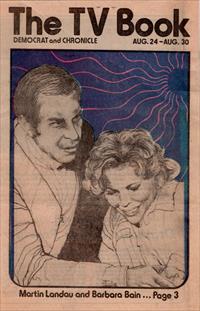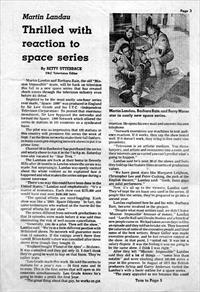Press
Thrilled with reaction to space series
By Betty Utterback, D&C Television Editor
Democrat and Chronicle supplement "The TV Book" cover,p3,p5, Rochester, New York, 24-30 August 1975. The local TV station was WHEC channel 10, at the time a CBS affiliate.


Martin Landau and Barbara Bain, the old Mission Impossible team, will be back on television this fall in a new space series that has created shock-waves through the television industry even before its debut.
Reputed to be the most costly one-hour series ever made, "Space: 1999" was produced in England by Sir Lew Grade and his I.T.C. (Independent Television Corporation). To protect that enormous investment, Sir Lew bypassed the networks and formed the Space: 1999 Network which offered the series to stations in 101 countries on a syndicated basis.
The pilot was so impressive that 128 stations in this country will premiere the series the week Sept. 7 as the three networks make their fall fanfare, in many cases pre-empting network shows to put it in prime time.
Channel 10 in Rochester has purchased the series and wisely chose to run it in the 7 to 8 p.m. Saturday time-slot vacated by Star Trek.
The Landaus are back at their home in Beverly Hills after 20 months in London where the series was made. Not surprisingly, Landau was openly excited about the whole venture as he explained how it happened and what makes the series unique during a recent interview.
"There's no way this could have been done in the United States." Landau said emphatically. "It's a matter of economics. Each show cost $275,000 and would have cost over $400,000 here.
"The special effects are mind-boggling. Each show was like a 2001: Space Odyssey. In fact. the same technicians who worked on the movie did the special effects for our show."
The series differed from network productions in that 24 episodes were made before it was sold thus eliminating the risk of mid-season cancellation.
"Generally, you do a pilot. Then sell the show," Landau said. "We're in a little different position with 24 finished shows. No network will guarantee more than 13 episodes. If the ratings aren't there they cancel. Brian Keith's show was cancelled after three shows even though they bought 15. Landau is probably referring to the January 1975 NBC series Archer, starring Brian Keith, which was cancelled after 6 episodes.
"England bought Planet of the Apes - 24 shows. It was cancelled and they got only 15. I don't think they're going to want to buy on that basis. They're rather irate. Planet of the Apes had 14 episodes, only 13 of which were shown
"Lou Grade made this work. He sold the series to stations for a year's run - 24 first runs and 24 re-runs. This is the first series that will open in 101 countries simultaneously. Lou Grade knows he's going to make a profit the first year.
"The great thing about that guy, he works on gut reaction. He opens his own mail and answers his own telephone.
"Network executives use machines to test audience reaction. If it works, they say the show tested well. If it doesn't work, they bring in five more vice presidents.
"Television is an artistic medium. You throw lawyers. and artists and executives into a room and their interests are so varied you can predict what 's going to happen."
Landau said he's seen 20 of the shows and feels they hold up like feature films in terms of production values.
"We have guest stars like Margaret Leighton, Christopher Lee and Peter Cushing, the pick of the English theater." Landau said. "Gosh, those guys are solid performers."
Now. it's an up to the viewers. Landau said. They've kept the six basic sets used in the series. If people like the series, they're prepared to go into a second year.
Landau explained how he and his wife, Barbara Bain, became involved in the project.
"Despite what most writers said, we didn't leave Mission: Impossible because of money," Landau said. Lucille Ball sold Desilu Studios and a bunch of new people came in. We had taken seven days to film an episode and they told us to take six. They lowered salaries of some of the executive people and fired some of the best writers. Bruce Geller was made executive producer. and he lost creative control of the show. At that point, I wanted out. It was not a salary dispute. It was the feeling it was not going to be the same show. I think I was right."
After they left Mission: Impossible Landau said they did a of things - "some less than notable" and were clocking about 100,000 miles a year in the process. In August of 1973 the British producers Sylvia and Garry Anderson visited the Landau's with a basic outline for a space series.
"The story appealed to me because this could relate to the humanity of science fiction." Landau said. "It's rooted in the present and the characters are space-age kids.
"It isn't that fantastic. We don't intend to go into space. We're shot into space. That way the story can be rooted in the present. yet allow us to do absolutely mad. crazy things.
"It's an interesting premise. We're not technically or emotionally prepared to go into space. Barbara plays a doctor, for example, and a case of measles out there is a real problem. We have science truth combined with science fantasy."
The story was so appealing the Landau's leased their Beverly Hills home to their friend, Bill Cosby, packed up and moved to London with their two daughters. Susan and Juliet. now 10 and 14.
"The kids loved it." Landau said. "It's a wet place but a soundstage is a soundstage is a soundstage."
There was something they all missed during their year and a half away from home.
"Hamburgers and hot dogs," Landau said with- out hesitation. "The closest thing they have is something done up in a baggy."
Now back to good old hamburgers and hot dogs, Landau said he's suffering through cultural shock from being away. Along about November, Lew Grade will make the big decision about the second year
"There is the feeling that we will go on." Landau said. "I think there's an awful lot of science fiction buffs out there, "